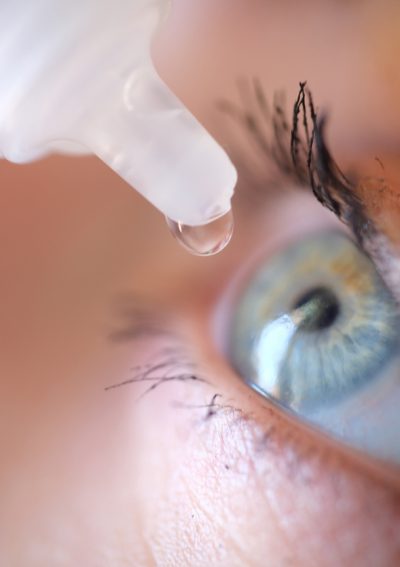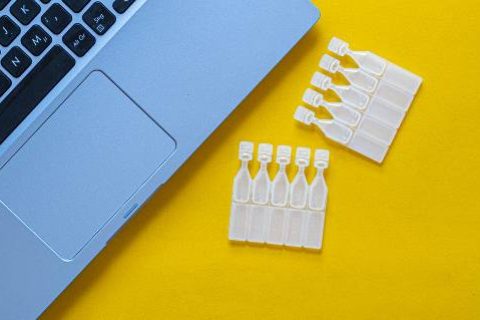EzriCare and Delsam Artificial Tears Eye Drops Recall
Global Pharma Healthcare issued a February 2023 recall for EzriCare Artificial Tears, Delsam Pharma Artificial Tears and Delsam Pharma Artificial Eye Ointment because of potential bacterial contamination. The CDC reported some people lost their vision and four people died.

EzriCare and Delsam Eye Drops Included in Recall
Global Pharma Healthcare recalled EzriCare Artificial Tears and Delsam Pharma Artificial Tears brand eye drops on Feb. 2, 2023. Walmart and Walgreens sold recalled EzriCare and Delsam Pharma eye drops over the counter. Customers could also buy these popular eye drops through Amazon.
- Delsam Pharma Artificial Tears and Lubricant Eye Drops (carboxymethylcellulose sodium) 10 mg in 1 mL, ½ fl. oz. (15 ml) bottle. NDC 72570-121-15, UPC 3 72570 12115 8
- EzriCare Artificial Tears Lubricant Eye Drops (carboxymethylcellulose sodium) 10 mg in 1 mL, ½ fl. oz. (15 ml) bottle. NDC 79503-0101-15, UPC 3 79503 10115 7
In addition to Delsam Pharma Artificial tears, Global Pharma Healthcare also recalled its Delsam Pharma Artificial Eye Ointment (mineral oil 15%, white petrolatum 83%, 3.5 grams / 1/8 oz.). The company issued the recall at the request of the U.S. Food and Drug Administration on Feb. 24, 2023.
Consumers can identify the product by looking for the following codes: NDC 72570-122-35 and UPC 3 72570 12235 3.
Why Were EzriCare and Delsam Artificial Tears Recalled?
Global Pharma Healthcare recalled EzriCare and Delsam Pharma Artificial Tears Lubricant Eye Drops because of potential microbial contamination that can cause serious infections. The FDA recommended that Global Pharma also recall its Delsam Pharma Artificial Eye Ointment for potential microbial contamination. The manufacturers noted that eye ointment packages could be compromised and were leaking.
The CDC and FDA have been investigating cases of Pseudomonas aeruginosa since May 2022. The agencies have since linked a multistate outbreak of a rare bacterium called Verona Integron-mediated Metallo-β-lactamase (VIM) and Guiana-Extended Spectrum-β-Lactamase (GES)-producing carbapenem-resistant Pseudomonas aeruginosa (VIM-GES-CRPA) to EzriCare eye drops.
As of March 21, 2023, 68 patients in 16 states have been infected, according to a CDC EzriCare eye drop recall update.
Injuries Associated With EzriCare and Delsam Artificial Tears
Injuries associated with recalled lots of EzriCare Artificial Tears include becoming infected with VIM-GES-CRPA as well as more common side effects not associated with a bacterial infection.
VIM-GES-CRPA is a rare strain of Pseudomonas aeruginosa. Prior to the outbreak involving EzriCare eye drops the strain had never been reported in the U.S. The bacterium can lead to eye infections that cause vision loss, infections throughout the body or even death.
As of May 15, 2023, there have been 14 reports of vision loss and four deaths among those infected.
- Blurry vision
- Discomfort or pain in the eye
- Eye redness
- Feeling of something in the eye
- Increased light sensitivity
- Yellow, green or clear eye discharge
VIM-GES-CRPA is difficult to treat because of its resistance to carbapenem antibiotics, drugs that are typically used to treat drug-resistant bacteria. Patients may need months of antibiotic care to resolve the infection.
Other EzriCare and Delsam Artificial Tears side effects not related to infections include eye pain, blurry vision and allergic reactions.
FDA and CDC Recall Guidance
According to the CDC and FDA, there is no need to be tested if you don’t have any infection symptoms. If your medical provider recommended that you use EzriCare Artificial Tears, Delsam Pharma Artificial Tears or Delsam Pharma Artificial Eye Ointment, you should contact them for dry eye treatment alternatives.
The CDC and FDA continue to investigate infections linked to recalled EzriCare Artificial Tears. The CDC found VIM-GES-CRPA in opened bottles of EzriCare Artificial Tears, but as of March 21, 2023, the agency hadn’t announced the results of testing on unopened bottles.
Global Pharma Healthcare has been placed on an FDA import alert. Under the alert, no products from this manufacturer are allowed into the U.S. According to the agency, Global Pharma failed to test products and didn’t have tamper-proof packaging, among other manufacturing violations.
Steps to Take If You Have Been Affected by the EzriCare and Delsam Recall
Here are a few steps consumers can take if they bought or used recalled eye drops. Fortunately, using recalled eye drops doesn’t automatically cause an infection or vision loss.
- Step 1: Stop using any recalled eye drops and seek medical attention for any signs of an infection.
- Step 2: Contact your health care provider for eye drops alternatives.
- Step 3: Report any eye drops problems to the FDA’s MedWatch Adverse Event Reporting program.
- Step 4: For questions about the recall or any potential refunds, contact the product’s distributor Aru Pharma/EzriCare by phone: 1-516-715-5181 or by e-mail: arupharmainc@yahoo.com. Contact Delsam Pharma by phone: 1-866-826-1306 or by e-mail: delsampharma@yahoo.com.
People who used recalled eye drops and suffered an infection, vision loss or other infection complications may be able to file an EzriCare or Delsam lawsuit for compensation. Other consumers have already filed individual injury lawsuits and class actions against Global Pharma, EzriCare, Aru Pharma, Walmart and others.
11 Cited Research Articles
Consumernotice.org adheres to the highest ethical standards for content production and references only credible sources of information, including government reports, interviews with experts, highly regarded nonprofit organizations, peer-reviewed journals, court records and academic organizations. You can learn more about our dedication to relevance, accuracy and transparency by reading our editorial policy.
- Centers for Disease Control and Prevention. (2023, May 15). Outbreak of Extensively Drug-resistant Pseudomonas aeruginosa Associated with Artificial Tears. Retrieved from https://www.cdc.gov/hai/outbreaks/crpa-artificial-tears.html
- U.S. Food & Drug Administration. (2023, February 27). FDA warns consumers not to purchase or use EzriCare Artificial Tears due to potential contamination. Retrieved from https://www.fda.gov/drugs/drug-safety-and-availability/fda-warns-consumers-not-purchase-or-use-ezricare-artificial-tears-due-potential-contamination
- U.S. Food & Drug Administration. (2023, February 24). Global Pharma Healthcare Issues Voluntary Nationwide Recall of Delsam Pharma Artificial Eye Ointment Due to Possible Microbial Contamination. Retrieved from https://www.fda.gov/safety/recalls-market-withdrawals-safety-alerts/global-pharma-healthcare-issues-voluntary-nationwide-recall-delsam-pharma-artificial-eye-ointment
- Twenter, P. (2023, February 13). Walmart faces suits over eye drops that allegedly killed 1, blinded 5. Retrieved from https://www.beckershospitalreview.com/legal-regulatory-issues/florida-woman-sues-walmart-in-1st-lawsuit-over-eye-drops-that-allegedly-killed-1-blinded-5.html
- EzriCare. (2023, February 2). EzriCare Artificial Tears – Discontinue Use. Retrieved from https://ezricare-info.com/
- Tin, A. (2023, February 2). FDA faults company behind recalled eye drops for multiple violations, bans imports. Retrieved from https://www.cbsnews.com/news/recall-eye-drops-infection-fda-global-pharma-multiple-violations-import-ban-ezricare-delsam/
- U.S. Food & Drug Administration. (2023, February 2). Global Pharma Healthcare Issues Voluntary Nationwide Recall of Artificial Tears Lubricant Eye Drops Due to Possible Contamination. Retrieved from https://www.fda.gov/safety/recalls-market-withdrawals-safety-alerts/global-pharma-healthcare-issues-voluntary-nationwide-recall-artificial-tears-lubricant-eye-drops-due
- Centers for Disease Control and Prevention. (2023, February 1). Outbreak of Extensively Drug-resistant Pseudomonas aeruginosa Associated with Artificial Tears. Retrieved from https://emergency.cdc.gov/han/2023/han00485.asp
- Centers for Disease Control and Prevention. (2023, January 20). Update: Multistate Cluster of VIM- and GES-producing Carbapenem-resistant Pseudomonas aeruginosa associated with Artificial Tears. Retrieved from https://www.aao.org/Assets/3a187c94-7889-42e8-84a1-6b2e88e7d374/638098403609770000/epix-multistate-pseudomonas-investigation-20jan2023-pdf?inline=1
- Boyd, K. (2022, February 9). Lubricating Eye Drops for Dry Eyes. Retrieved from https://www.aao.org/eye-health/treatments/lubricating-eye-drops
- NIH. (2020). Artificial Tears Lubricant Eye Drops – carboxymethylcellulose sodium solution/ drops. Retrieved from https://dailymed.nlm.nih.gov/dailymed/fda/fdaDrugXsl.cfm?setid=ac1ea23c-f1c6-418f-921e-58553ee919cb&type=display
Calling this number connects you with a Consumer Notice, LLC representative. We will direct you to one of our trusted legal partners for a free case review.
Consumer Notice, LLC's trusted legal partners support the organization's mission to keep people safe from dangerous drugs and medical devices. For more information, visit our partners page.
844-420-1914

